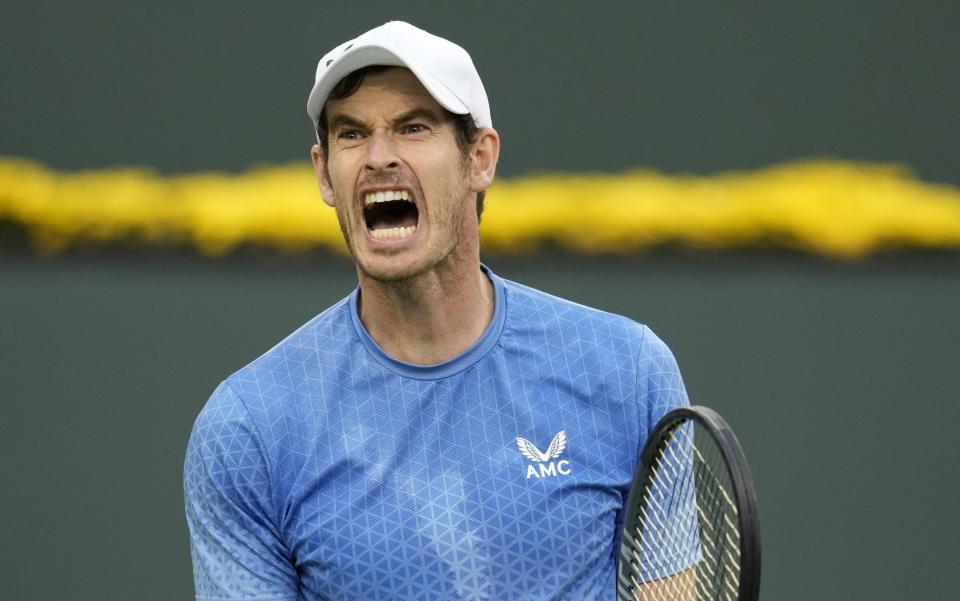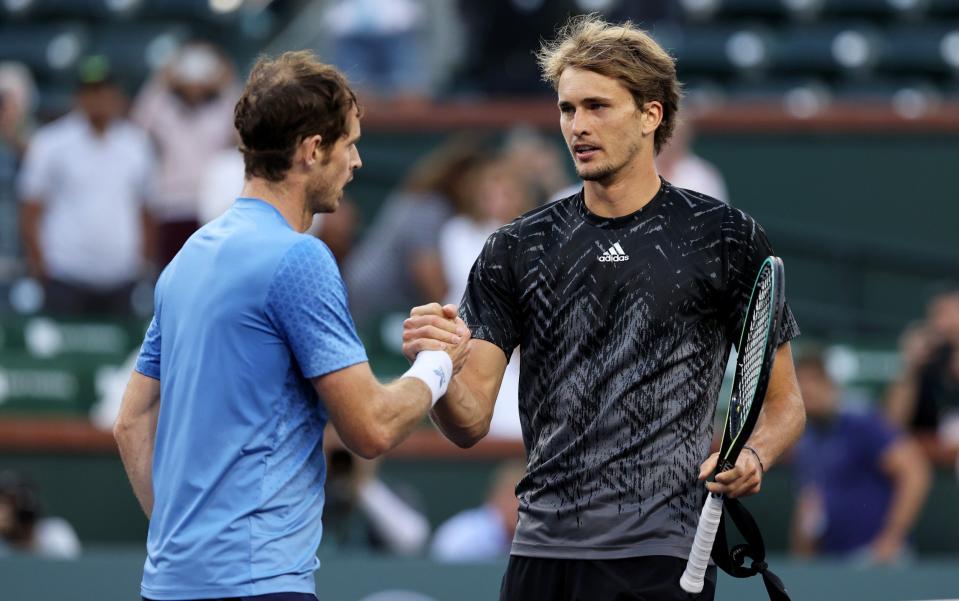Angry Andy Murray knocked out of Indian Wells after grudge match with Alexander Zverev

It seemed appropriate that this grudge match should end with Andy Murray driving the ball from short range at the body of Alexander Zverev – a punchy manoeuvre that his former coach and mentor Ivan Lendl used to describe as “the tube”.
Unfortunately for Murray, Zverev pulled off two reflex volleys and stole a point he should never have won, thus concluding this competitive match by a 6-4, 7-6 scoreline and dodging the prospect of a deciding set.
Murray had admitted on Sunday that he and Zverev weren’t “best friends” and “don’t chat a whole lot”, presumably because of his insistence that the domestic-violence allegations made by Zverev’s former girlfriend – allegations which Zverev denies – should be investigated.
That personal animus may help to explain why Murray was furious with himself at the conclusion of this hard-fought tussle, repeatedly shouting into his own clawed hand as he walked off the court with his racket bag slung over his shoulder.
But the wider and more important point was that another winnable match had slid away. Murray had plenty of opportunities, including on that very last point, which he could so easily have seized. And this has been the story of his last couple of months.
What. A. Finish! 👏 @AlexZverev edges Andy Murray 6-4 7-6(4) to reach the round of 16 at #BNPPO21 for the first time since 2016. pic.twitter.com/a2ROItrtSI
— Tennis TV (@TennisTV) October 13, 2021
Since Wimbledon, Murray’s metal hip has thrown up fewer issues than before, allowing him to spend more time on the practice court and put more tournaments together back-to-back.
This, in turn, has improved the speed of his movement and the quality of his shot-making. Unfortunately, though, he is still prone to mental short-outs when the pressure is at its highest. He has played five tie-breaks since March and lost the lot – a statistic which you would never have seen from the old, flesh-and-blood Murray.
“I don't think I played well today,” said Murray, who waited only a few minutes before he came into the interview room, and was thus still fuming when he arrived. “There was some good stuff in there, but it was mixed in with bad. There was no consistency. I’m disappointed because I want to be winning these matches. I haven't in the last few months. Yeah, something needs to change.”

Once Murray had made it back to the locker-room, however, his coach Jamie Delgado must surely have accentuated the positive. Remember that he was up against the world No4 in Zverev – the highest-ranked opponent he has faced since his body betrayed him four years ago, and a man who had only lost a single match since Wimbledon.
Murray’s greatest frustration is that, while his body and his tennis may be on the up, he still isn’t back to the steely mindset that once made him such a devastating force.
As he explained: “If you're not quite feeling your shots that well, are not sure how the ball's going to come out of your racket sometimes, that's when there's a little bit of indecision. You change your mind, and that's when the mistakes can come.
“I guess it’s a case of getting through some of those matches. Just keep building, and hopefully get back to winning tournaments.”
Murray is now entered into next week’s event in Antwerp, where he won the title out of the blue in 2019 by defeating Stan Wawrinka in the final. He could do with some more of that medicine, especially as he has just fallen 51 places to No172 in the world thanks to those Antwerp points coming off his record.
In the meantime, he was asked after the match about the vaccination issue that will crop up again at January’s Australian Open. Players flying out to Melbourne at the start of next year are expected to have very different quarantine arrangements depending on whether they have been double jabbed or not.
Murray supported this approach to the vaccination question on Tuesday night. “Australia in particular has been very, very strict,” he said. “The public there have had to endure a painful 18 months. If people are going to come into the country and potentially risk an outbreak in their community, that's understandable.
“It's not to say you can't play. You might just have to leave a few weeks earlier than everyone else. That's the player's choice. If the local government puts that in place then I would support that.
“I support vaccination," Murray added. "I hope that more of the players get it done. I don't want to come off the court having played a match and be talking about something like that. We're concentrating on the vaccine a lot because a lot of the players haven't taken it yet.
“Hopefully people gain more confidence in it over time, [and] can see the benefits outweigh any of the potential risks or side-effects that people are worried of. I understand that in rare cases, people can get some side effects. For the most part, the benefits way outweigh any of the risks.”

 Yahoo Sport
Yahoo Sport 





































